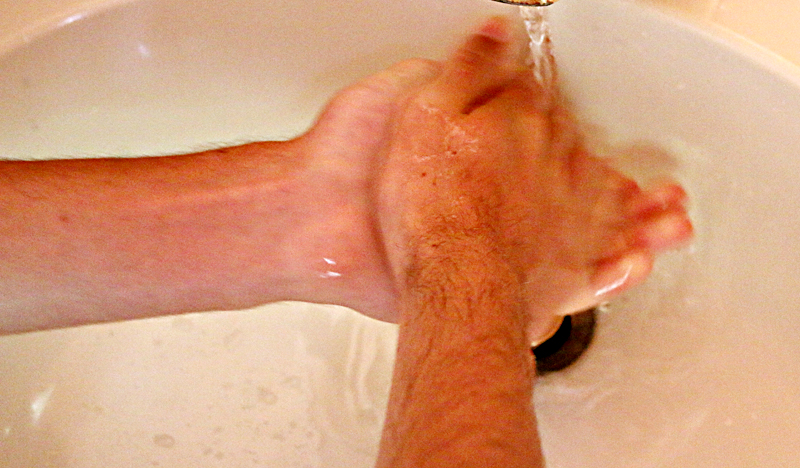I f you have antibacterial soap in your home, take a good long look at it, as it will soon be a thing of the past because the Food and Drug Administration of the United States issued a final rule that antibacterial soaps and other consumer antiseptic wash products — which contain at least one or more of 19 certain active ingredients and can be purchased over the counter — can no longer be marketed, as there is no evidence that they work better than their counterparts which do not include antibacterial ingredients; and in fact could actually be more harmful than good, as they pose possible health risks over the long term.
Say Goodbye to Antibacterial Soap Due to Ban on Ingredients
The ingredients in question — which include triclosan used in liquid soaps and triclocarban used in bar soaps as the most commonly used ingredients — were not proven by manufacturers to be “both safe for long-term daily use and more effective than plain soap and water in preventing illness and the spread of certain infections.”
The Food and Drug Administration issued a proposed rule on Monday, December 16, 2013 after some data suggested that long-term exposure to certain active ingredients used in antibacterial products could pose health risks — such as bacterial resistance or hormonal effects — and since that proposed rule was issued, some manufacturers have already started removing these ingredients from their products. Manufacturers will have one year to comply with the issuing of the final rule by removing those ingredients from the market or reformulating the products in question.
Manufacturers were required to provide the Food and Drug Administration with additional data on the safety and effectiveness of certain ingredients used in antibacterial soaps and other consumer antiseptic wash products if they wanted to continue marketing antibacterial products containing those ingredients. The result of that marketing effort led customers to believe that those consumer antiseptic wash products were superior at preventing the spread of germs; but no definitively conclusive data from clinical studies exists which demonstrate that using these products were more effective in any way in preventing human illness or reducing infection than plain soap and water.
Washing Your Hands With Soap is Proven to Be Effective
“Washing with plain soap and running water remains one of the most important steps consumers can take to avoid getting sick and to prevent spreading germs to others”, according to this official press release from the Food and Drug Administration. “If soap and water are not available and a consumer uses hand sanitizer instead, the U.S. Centers for Disease Control and Prevention (CDC) recommends that it be an alcohol-based hand sanitizer that contains at least 60 percent alcohol.”
This final rule does not affect consumer hand “sanitizers” or wipes, or antibacterial products used in health care settings.
When Should You Wash Your Hands?
- Before, during, and after preparing food — here is an article I posted here at The Gate years ago about a woman who sneezes while preparing food but does not wash her hands before fulfilling the order
- Before eating food
- Before and after caring for someone who is sick
- Before and after treating a cut or wound
- After using the toilet
- After changing diapers or cleaning up a child who has used the toilet
- After blowing your nose, coughing, or sneezing
- After touching an animal, animal feed, or animal waste
- After touching garbage
What is the Proper Way to Wash Your Hands?
- Wet your hands with clean running water — warm or cold, although I prefer warm to hot — and apply soap.
- Rub your hands together to make a lather and scrub them well; be sure to scrub the backs of your hands, between your fingers, and under your nails.
- Continue rubbing your hands for at least 20 seconds. Need a timer? Hum the “Happy Birthday” song from beginning to end twice.
- Rinse your hands well under running water.
- Dry your hands using a clean towel or air dry.
What if Soap and Water are Not Available?
If soap and water are not available, use an alcohol-based hand sanitizer that contains at least 60 percent alcohol. Alcohol-based hand sanitizers can quickly reduce the number of germs on hands in some situations, but keep in mind that sanitizers do not eliminate all types of germs. Also, it is probably not a good idea to eat foods that you intend to eat with your hands without using an eating utensil — such as a fork — immediately after using a hand sanitizer, as there is a slight risk of ingesting the ethyl alcohol from the hand sanitizer. This precaution especially applies to young children, according to this article written by Sanjay Gupta for CNN.
You may want to consider washing your hands before passing through an airport security checkpoint — but ensure that you thoroughly rinse off the soap you used, as the glycerine found in soap and hand lotion could possibly set off the scanner device.
Advice and Recommendations Based on My Experiences
I offered the following advice from an article posted here at The Gate on Friday, November 28, 2014 pertaining to 16 tips to stay healthy while traveling when all you really need is to follow one tip, as I can vouch for the importance of properly washing your hands:
- Perhaps I may be obsessive, but I always wash my hands when I touch someone or something about which I am uncertain as to whether or not it — or he or she — is clean. The extra time spent washing your hands can save you from much more down time while suffering from less than good health. That is an investment of my time on which I receive an excellent return.
- Someone once commented to me upon observing me that I wash my hands similar to a doctor. This means washing every part of my hands in warm water from the wrists to the fingertips and scraping underneath each fingernail thoroughly for at least 30 seconds — long after a lather of suds has been built up on my hands.
- Before I begin washing, I use a paper towel to turn on the faucet, pump the soap and turn off the faucet when I am done, as well as open the door to exit so that I do not come into contact with germs and contaminate myself — and, contrary to popular belief, it does not matter whether or not the soap is of the antibacterial variety.
- If the soap is a solid bar rather than in liquid form, I wash the exterior of the soap several times before I use it to wash myself.
- I tend to occasionally rub my eyes, which could potentially be a recipe for disaster if my hands are contaminated. However, once I touch something unknown to be contaminated, I will either hold off on rubbing my eyes or employ a portion of my body to do so instead — such as the back of one of my fingers, or my arm.
- Because the hands are the most likely body parts to be contaminated by germs — other than bare feet, that is — they require more care than other parts of your body, such as your forehead, your neck or your face. However, those body parts should be clean as well. Especially keep contamination away from your eyes, ears and nose, as they are amongst the most susceptible parts of your body to microorganisms which cause infections and illnesses.
Summary
You might have noticed during your travels that antibacterial soap is not all that common in places such as washrooms in airports, lavatories aboard airplanes, and bathrooms in hotel rooms; and yet, somehow we manage to survive while traveling. Would a hotel guest wash his or her hands fewer times if less soap was provided in the hotel room due to initiatives supposedly designed to save the environment and save money in the process? Could antibacterial soap and and other consumer antiseptic wash products be as harmful to the environment as cleansing products which contained microbeads?
In fact, you probably already know that I do not use hand sanitizers or antiseptic wipes, as I have stated — in many past articles such as this one — that you do not need them in order to stay healthy or to protect yourself from becoming ill; and I maintain that stance to this day.
Washing your hands regularly is amongst the best ways to prevent the spread of diseases, infections, and even illnesses such as the common cold. I speak from experience: with one or two minor exceptions that are too negligible to even mention, I have not suffered from a cold, fever or other illness in several years since I adopted the aforementioned habits in order to avoid getting sick or catching an illness. I have never even had a flu shot. That is because I am diligent about washing my hands.
Some people might suggest that I have tendencies towards being obsessive and compulsive when it comes to washing my hands. Others might conclude that my results might be psychosomatic in nature. Still others have ridiculed the number of times I have espoused such simple yet effective advice as washing hands to stay healthy.
Does it really matter what people think about me pertaining to washing my hands?
All I know is that it continues to work for me to this day; and following the aforementioned advice can work for you as well if you are diligent about washing your hands properly to increase your chances of avoiding illnesses in the future — with or without antibacterial soap or other consumer antiseptic wash products.
Photograph ©2016 by Brian Cohen.

